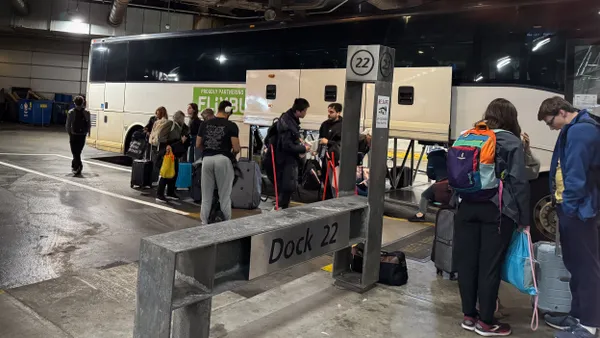Dive Brief:
- San Francisco City Attorney Dennis Herrera on Tuesday subpoenaed ride-sharing companies Uber and Lyft for information on driver pay and benefits, and whether the companies classify drivers as independent contractors or employees.
- The request comes after a California Supreme Court ruling that set new requirements for companies using independent contractors, including that they provide fair wages and benefits.
- "San Francisco’s laws help ensure that employers provide a fair day’s wage for a fair day’s work," said Herrera, as reported by the San Francisco Chronicle. "We are not going to turn a blind eye if companies in San Francisco deny workers their pay and benefits."
Dive Insight:
If Uber and Lyft were found to be out of compliance with the California ruling, the consequences could be costly. The companies must show that the drivers currently considered as independent contractors — nearly all of them — meet three criteria: that the company doesn’t control how they work, that their work is outside the company’s main scope and that they run an independent business. If they can't meet that test, the companies would have to provide their employees minimum wage, overtime, reimbursement for business expenses and unemployment coverage.
Although Lyft said in a statement to the Chronicle that it would help the attorney’s office "fully understand Lyft’s business model, including our relationship with drivers," it’s an issue that ride-sharing companies have fought fiercely. Lyft said in its statement that its drivers make a median income of $25 an hour; before expenses that can run between $3 and $5. But other studies have found that drivers are making below minimum wage; an MIT study of more than 1,000 ride-share employees found their pretax profit was $3.37 an hour and that three quarters of drivers made below minimum wage (in response to methodology questions, researchers are looking over the data). Glassdoor estimates that Uber drivers make $30,000 a year on average.
A ruling over employee status — which legal experts say is the likely outcome of the subpoena — could put companies in a tough spot with new expenses that could sharply raise rates and undercut its advantage over taxis. Seattle has been considering a rule that would raise a minimum ride-share fare by more than a dollar to cement more fair wages. No doubt other California cities — and cities across the country — will watch San Francisco’s next steps, as more jurisdictions grapple with the changing nature of the gig economy.











